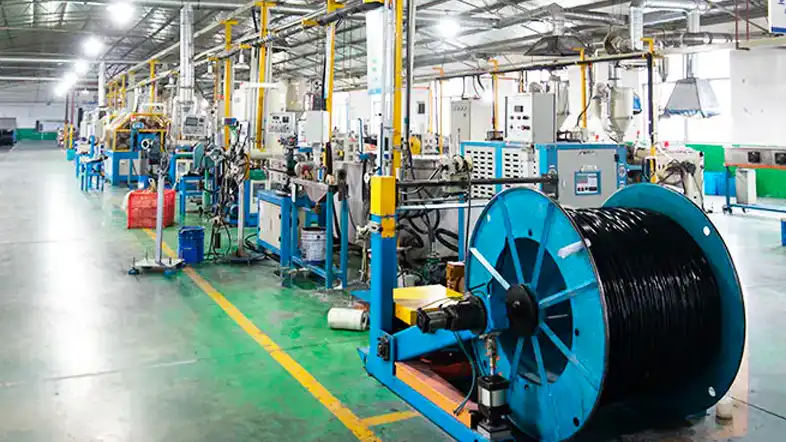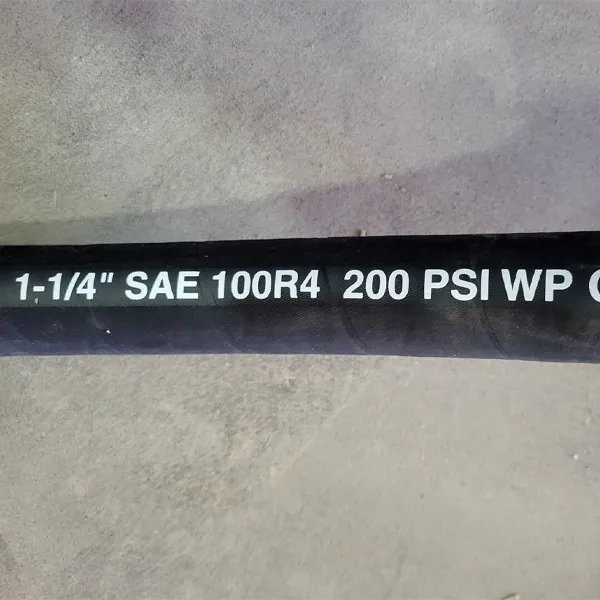Are you seeking the opportunity for your hydraulic hose business?
A reliable hydraulic hose manufacturer is the basically important factor that can ensure your hydraulic hose workshop can work well.
There is a complete guide to hydraulic hose pipe manufacturers.
Let’s dive into this post now!
Why Use Hydraulic Hose Pipe?
![The Complete Guide to Hydraulic Hose Pipe Manufacturer [2023] 1 hydraulic hose pipe](https://kingdaflex.com/wp-content/uploads/2021/12/hydraulic-hose-pipe.jpg)
The hydraulic hose pipe, also a hydraulic hose, is the must-have device for the hydraulic project, which needs to get the power or heat from the hydraulic system, powered by the hydraulic hose pipe.
The hydraulic hose pipe is made of synthetic rubber material, reinforced by stainless steel wire, and the raw material for making a hydraulic hose is mainly synthetic rubber.
To ensure the engineering and construction can go well and fluently, we need to use the hydraulic hose pipe to convey the hydraulic fluids, in order to provide heat and power for running the machinery powered by the hydraulic system.
So the hydraulic hose pipe can exist in any place that needs a construction project, and hydraulic hose pipe can be widely applied for many fields, such as building construction, oil extraction, mining, heavy-duty industry machinery and etc.
Hydraulic Hose Pipe Manufacturer Selection Factors
![The Complete Guide to Hydraulic Hose Pipe Manufacturer [2023] 2 hydraulic hose pipe manufacturer](https://kingdaflex.com/wp-content/uploads/2021/12/hydraulic-hose-pipe-manufacturer-1.jpg)
Here are some key factors for your hydraulic hose pipe manufacturer selection.
Advanced hydraulic hose manufacturing equipment: The hydraulic hose pipe manufacturing equipment is the key factor that can ensure the big capacity, monthly or yearly.
When selecting a hydraulic hose pipe manufacturer, there are several important factors to consider:
- Quality: Look for a manufacturer that prioritizes quality in their products. Consider their quality control processes, certifications, and reputation for producing reliable and durable hydraulic hose pipes.
- Experience and Expertise: Choose a manufacturer with extensive experience and expertise in hydraulic hose pipe manufacturing. They should have a deep understanding of industry standards, materials, and technical requirements to provide effective solutions.
- Customization Capabilities: Consider whether the manufacturer offers customization options for hydraulic hose pipes. Different applications may have unique specifications, so the ability to tailor hoses to specific requirements can be crucial.
- Range of Products: Check the manufacturer’s product range to ensure they offer a wide variety of hydraulic hose pipes suitable for different applications and industries. This demonstrates their versatility and ability to cater to diverse needs.
- Manufacturing Capabilities: Assess the manufacturer’s production facilities and capabilities. Look for advanced machinery, efficient processes, and quality control measures to ensure consistent production of high-quality hose pipes.
- Testing and Certification: Determine if the manufacturer conducts thorough testing on their hydraulic hose pipes. Certifications from recognized organizations validate their adherence to quality standards and demonstrate their commitment to product performance and safety.
- Availability and Timely Delivery: Consider the manufacturer’s ability to meet your demand for hydraulic hose pipes. Check their production capacity, inventory management, and track record for timely delivery to ensure a reliable supply.
- Customer Support: Evaluate the manufacturer’s level of customer support. A responsive and knowledgeable support team can assist with technical queries, provide guidance, and address any concerns or issues that may arise.
- Pricing and Value for Money: Compare the pricing of different manufacturers while considering the overall value for money. It’s important to strike a balance between cost-effectiveness and quality to ensure a good return on investment.
- Reputation and References: Research the manufacturer’s reputation in the industry. Look for customer reviews, testimonials, and references to gauge their reliability, customer satisfaction, and long-term performance.
By considering these factors and conducting thorough research, you can make an informed decision when selecting a hydraulic hose pipe manufacturer that best suits your specific requirements and expectations.
Rubber Hose Manufacturing Process

The manufacturing process of rubber hoses typically involves the following steps:
- Raw Material Preparation: Select suitable rubber materials such as styrene-butadiene rubber (SBR), nitrile rubber (NBR), etc., based on the product requirements. These rubber materials are usually supplied in the form of sheets, pellets, or granules.
- Mixing Raw Material: The rubber materials are mixed with various additives such as plasticizers, accelerators, antioxidants, and fillers in a rubber mixer. This process ensures the uniform distribution of additives and enhances the physical properties of the rubber compound.
- Extrusion: The mixed rubber compound is fed into an extruder, which is a machine with a rotating screw inside a barrel. The screw conveys the rubber compound forward while applying heat and pressure. This process softens the rubber and forms it into a continuous shape, known as an extrudate.
- Reinforcement: In order to strengthen the hose and provide structural integrity, reinforcement materials such as textile fibers or metal wires are typically embedded within the rubber during the extrusion process. These materials are placed in a specific pattern to provide the desired strength and flexibility to the hose.
- Vulcanization: The extruded hose is then vulcanized, which involves subjecting it to heat and pressure in a vulcanizing chamber or autoclave. This process causes a chemical reaction within the rubber compound, resulting in cross-linking of the polymer chains and the formation of a strong, elastic material. Vulcanization ensures that the rubber hose retains its shape and can withstand high pressures and temperature variations.
- Finishing: After vulcanization, the rubber hose is cooled and trimmed to the desired length. It may undergo additional processes such as surface treatments, marking, and testing to meet specific product requirements.
- Quality Control: The finished rubber hoses undergo rigorous quality control checks to ensure they meet the required specifications and standards. This may involve testing for physical properties, such as tensile strength, elongation, and burst pressure, and conducting inspections for visual defects.
- Packaging and Shipping: The final step involves packaging the rubber hoses and preparing them for shipment to customers or distribution centers.
Please note that the specific manufacturing process may vary depending on the type of rubber hose being produced and the manufacturing equipment used.
Final Thoughts




